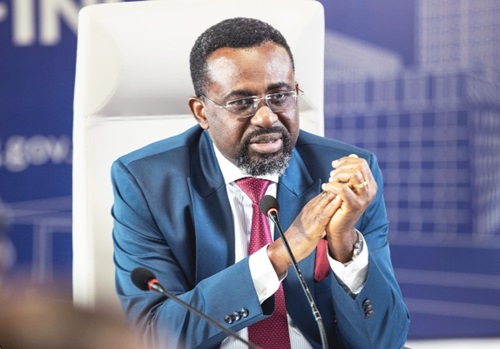CBN Shocks Market: MPR Slashed to 27% Amidst Rising Growth Hopes and Falling Inflation

The Central Bank of Nigeria's (CBN) Monetary Policy Committee (MPC) recently initiated a monetary easing phase, resolving to reduce the Monetary Policy Rate (MPR) by 50 basis points to 27 percent from its previous 27.50 percent. This significant decision, announced by CBN Governor Mr. Olayemi Cardoso following a two-day MPC meeting in Abuja, signals a strategic shift towards supporting economic expansion amid sustained disinflation and stronger Gross Domestic Product (GDP) growth recorded for the second quarter of 2025.
Governor Cardoso explained that the committee’s decision was primarily predicated on the sustained disinflation observed over the past five months, alongside improvements in various macroeconomic indicators. These include enhanced output growth, a stable exchange rate, and robust external reserves. He also linked the rate cut to projections of declining prices for the remainder of the year and the imperative to bolster economic recovery efforts. Emphasizing the CBN's unwavering commitment, Cardoso declared that the bank's ultimate goal is to achieve single-digit inflation, stating, “That’s our goal, and that is something that we are very resolute on, and we will not stop until we get there.”
Beyond the MPR adjustment, the MPC implemented several other key policy changes. The standing facilities corridor around the MPR was adjusted to +250/-250 basis points from +500/-100 basis points. This move aims to boost interbank market transactions and enhance market stability. Furthermore, the committee reviewed the Cash Reserve Requirement (CRR) for commercial banks, reducing it to 45 percent from 50 percent, while retaining that of merchant banks at 16 percent. A new measure was also introduced, imposing a 75 percent CRR on non-TSA public sector deposits, with the Liquidity Ratio (LR) remaining at 30 percent. These adjustments collectively seek to ease credit conditions and manage banking system liquidity.
Cardoso expressed satisfaction with the prevailing macroeconomic stability, underscored by the increased momentum of disinflation in August 2025—the highest in five months. This deceleration, supported by monetary policy tightening, exchange rate stability, increased capital inflows, and a surplus current account balance, has helped anchor inflation expectations. Gross external reserves remained robust at $43.05 billion as of September 11, 2025, with an import cover of 8.28 months. Similarly, the Q2 2025 current account balance recorded a significant surplus of $5.28 billion. The Governor reiterated the MPC’s proactive, data-driven approach, assuring the public of the CBN's readiness to build resilience and buffers against potential shocks to ensure continued stability.
Regarding the financial sector, the MPC acknowledged the continued resilience of the banking system, with most financial soundness indicators remaining within prudential benchmarks. Significant progress has been made in the ongoing bank recapitalisation exercise, with 14 banks having fully met the new capital requirement. The committee urged continued implementation of policies to ensure the successful completion of this exercise. Moreover, the successful termination of forbearance measures and waivers on single obligors was noted for promoting transparency, risk management, and long-term financial stability, with the MPC reassuring the public that its impact is transitory and poses no threat to the banking system's soundness.
Despite the positive developments, the committee observed a persistent build-up of excess liquidity in the banking system, largely stemming from fiscal releases driven by improved revenues. Governor Cardoso noted concerns about the negative effects of FAAC allocations on monetary stability and emphasized the continuous monitoring and deployment of tools to ensure stability. The adjustment of the standing facilities corridor was partly informed by the need to manage this excess liquidity and ensure effective functioning of the interbank market.
The CBN's policy shift garnered commendation from key stakeholders. Mr. Adewale-Smatt Oyerinde, Director-General of the Nigeria Employers’ Consultative Association (NECA), lauded the MPR reduction, acknowledging the easing inflationary pressures. However, he cautioned that the benefits would hinge on effective transmission into the real economy, pointing to persistently high CRR and other liquidity restrictions as potential limiting factors. Oyerinde also highlighted the ongoing challenge of high food inflation and stressed the need for complementary government interventions, including stabilizing the exchange rate, improving agricultural security and productivity, and tackling bottlenecks in energy, transport, and regulation.
Similarly, Dr. Muda Yusuf, Chief Executive Officer of the Centre for the Promotion of Private Enterprise (CPPE), hailed the MPC’s decision as a strategic and well-timed policy shift from stabilization to a growth accelerator. He argued that if sustained and complemented by appropriate fiscal and structural reforms, these measures would stimulate economic growth, create jobs, improve private sector performance, and moderate inflation sustainably. Yusuf noted that the policy easing followed five consecutive months of declining inflation, indicating the success of previous tightening measures. He further explained that by lowering the MPR and CRR, the CBN is working to improve liquidity, reduce borrowing costs, and unlock capital for productive sectors.
The implications of these decisions are expected to include improved credit conditions and strengthened financial intermediation, making financing more accessible for businesses, especially Small and Medium Enterprises (SMEs). Lower costs of funds are anticipated to encourage new investments, support business expansion, and enhance capacity utilization in the real sector, ultimately stimulating output growth and job creation. Both NECA and CPPE emphasized that fiscal policy must play a complementary role, advising fiscal authorities to sustain fiscal consolidation, prioritize critical infrastructure investment, and strengthen regulatory frameworks to foster a more business-friendly environment.
You may also like...
Liverpool Crisis? Reds Face Scrutiny After Consecutive Defeats

Liverpool faces scrutiny after two straight losses, with BBC Sport expert Chris Sutton highlighting their defensive vuln...
Man Utd Managerial Shake-Up Looms: Amorim Speculation Ignites Southgate Concerns

Manchester United faces a managerial dilemma as Ruben Amorim's position comes under scrutiny amidst a dire start to the ...
Bone Lake: Twisted Thriller Sparks Critical Debate on Erotic Horror

Mercedes Bryce Morgan's <em>Bone Lake</em> explores the 'sexy horror' genre, blending psychological manipulation and bla...
Country Power Couple Kane & Katelyn Brown Land Lifetime Christmas Film Deal Based on Hit Song!

Country music stars Kane and Katelyn Brown are making their debut as television executive producers for Lifetime's holid...
Mariah Carey Breaks Silence On Eminem Feud & ‘8 Mile’ Rumors!

Mariah Carey recently discussed her long-standing feud with Eminem, confirming rumors that he once asked her to play his...
Coronation Street Shocker: Beloved Star Sally Ann Matthews Bids Farewell to Soap

Coronation Street bids farewell to two prominent stars as Sally Ann Matthews makes an emotional exit as Jenny Connor aft...
Tems Shatters Records: First Nigerian Female Artist to Hit 10 Million US Units!

Tems has made history as the first female Nigerian artist to sell over 10 million units of a single in the U.S. with her...
Autumn's Hottest High Street Bags Revealed: Top Trends Starting from Just £20!

For Autumn/Winter 2025, bags transcend their functional role to become the main event in fashion, with a diverse array o...




